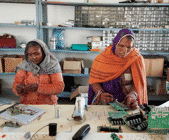Here’s another guest post from Diane Fiksel. Back in March 2017, we published Diane’s post about her visit to PUKAR, an IDS-supported NGO in Mumbai. Regular readers of the IDS blog and Facebook page will probably be familiar with PUKAR and its work.
This month, while the IDS annual report is in production, we’re presenting Diane’s account of her visit to the Barefoot College in Rajasthan. The Barefoot College (not to be confused with PUKAR’s Barefoot Researchers) does not receive funds from IDS, but we think the story is interesting and worth sharing. Thanks again, Diane!
In January 2017, I visited the remote village of Tilonia, in Rajasthan, India, home of a unique institution called Barefoot College. It was founded in 1972 by the social activist Bunker Roy with the purpose of enabling self-sufficiency and sustainability for rural villages by teaching them new skills and helping them to adopt renewable technologies. Women from villages across India and all over the world, many of them grandmothers, with little or no education, come here to be trained as solar engineers. The college does not hand out certificates, and proudly rejects the traditional academic model in favor of practical, real-world learning.
Since they all speak different languages, the students and teachers communicate through gestures, and they rely on pictorial guidebooks. After a 6-month rigorous training program, the women have learned to assemble and operate complex electronic equipment, and then return to their villages with new skills and newfound respect. They install
Women from villages across India and all over the world, many of them grandmothers, with little or no education, come here to be trained as solar engineers. The college does not hand out certificates, and proudly rejects the traditional academic model in favor of practical, real-world learning.
Since they all speak different languages, the students and teachers communicate through gestures, and they rely on pictorial guidebooks. After a 6-month rigorous training program, the women have learned to assemble and operate complex electronic equipment, and then return to their villages with new skills and newfound respect. They install  solar electric panels and train other women to help electrify their villages, enabling people to work and children to study at night using a clean energy source.
solar electric panels and train other women to help electrify their villages, enabling people to work and children to study at night using a clean energy source.
 In addition, Barefoot College trains women in other professions such as dentistry, and in the production of handicrafts that generate income. Another project involves developing solar cookers based on simple, robust technology that can be deployed in villages. A parabolic array of mirrors concentrates sunlight on a cooking element, providing a clean, emission-free alternative to kerosene, better for both human health and the environment.
In addition, Barefoot College trains women in other professions such as dentistry, and in the production of handicrafts that generate income. Another project involves developing solar cookers based on simple, robust technology that can be deployed in villages. A parabolic array of mirrors concentrates sunlight on a cooking element, providing a clean, emission-free alternative to kerosene, better for both human health and the environment.
 They have adopted a unique means of communication to gain acceptance for their innovative work. They use a variety of homemade puppets to educate villagers about important issues such as personal hygiene, and also to help resolve village conflicts by having the puppets debate different points of view. (They proudly point out that the puppets are constructed from World Bank reports, which would otherwise be useless to them.)
They have adopted a unique means of communication to gain acceptance for their innovative work. They use a variety of homemade puppets to educate villagers about important issues such as personal hygiene, and also to help resolve village conflicts by having the puppets debate different points of view. (They proudly point out that the puppets are constructed from World Bank reports, which would otherwise be useless to them.)
Diane G. Fiksel




